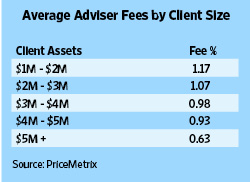
Whether you're single or have a large portfolio, working with a financial advisor can help you meet your financial goals. We'll be discussing the benefits of working with financial advisors, how to select an advisor and what it costs. These tips are applicable to all situations. Whether you're considering working with a financial advisor, or are already in the process, you'll be able to find the right one for your needs.
Signs you need a financial advisor
While some people are born with a natural flair for money management, many people need to seek the advice of a financial advisor. The services of an advisor will help you avoid making costly mistakes and make sure that your finances are in good hands. Here are some signs to look out for when you should consider hiring a financial planner:
Insufficient time or lack of expertise. It could be that you don't have enough time or are too busy to manage your finances. While you might be knowledgeable in your chosen field, you may not have the time to devote to your financial planning. An advisor will take your lifestyle into account and help make the right investments. Your time is valuable and you might not be using it to achieve your goals.

Working with a financial advisor has many benefits
Working with a financial planner could be the ideal solution if you're trying to manage multiple priorities. Financial advisors help people achieve multiple goals by creating customized financial plans. They can help you maximize your wealth as well as take care of your loved ones. Here are some of these benefits of working closely with a financial advisor.
Tax planning: Financial advisors are trained in tax planning to help you reduce your taxable earnings and lower the amount of taxes you pay. They can also help you choose growth-oriented investments over income-focused ones, or even help you transfer assets to family members. No matter how complicated your investment strategy, a financial advisor will always take into account your tax situation when making recommendations. It's important to fully understand your tax situation before you make any financial plans.
Cost of working with a financial advisor
How much does it take to work with a professional financial advisor? Fees for financial planners are determined by their experience and the services they provide. An hourly fee for working with a financial planner can run from $200 to $400. If the advisor is only able to provide advice on one investment or requires a monthly subscription fee, hourly rates may be higher. It is crucial to find an advisor who you can trust, and who is transparent about the fees they charge.
Fees charged for financial advice depend on the amount of the client's account and the execution of the portfolio. A financial advisor should explain the value of his or her services and justify their fees before agreeing to work with you. Many advisors will not disclose their fee structure and you should avoid those who attempt to sell you on working with them. Avoid advisors who claim they are able to help you for no charge or that you don't need to worry about the costs.

Choosing a financial advisor
There are several things you should look for when hiring a financial advisor. First, the financial consultant should be able reveal any conflicts of interests. You'll want information about how much time your advisor spends communicating, as well as the success criteria that they use. The final thing you need to know is whether the advisor is part a team or works solo.
It is essential to start by finding the right advisor. The financial decisions made by a financial adviser will have a significant impact on your financial future. It is important to do your research before you meet with them. Make sure to take your time choosing a financial advisor, as investing entails risk. Always remember to spend time researching a potential advisor before hiring one. You must also consider whether the advisor will be a good fit for your financial situation. Remember that advisors can make or lose money. You need to take into consideration your financial situation and goals before you hire one.
FAQ
What are the various types of investments that can be used for wealth building?
There are many investments available for wealth building. Here are some examples:
-
Stocks & Bonds
-
Mutual Funds
-
Real Estate
-
Gold
-
Other Assets
Each of these has its advantages and disadvantages. Stocks or bonds are relatively easy to understand and control. However, they tend to fluctuate in value over time and require active management. However, real property tends better to hold its value than other assets such mutual funds or gold.
It all comes down to finding something that works for you. Before you can choose the right type of investment, it is essential to assess your risk tolerance and income needs.
Once you have chosen the asset you wish to invest, you are able to move on and speak to a financial advisor or wealth manager to find the right one.
What are some of the benefits of having a financial planner?
A financial strategy will help you plan your future. It will be clear and easy to see where you are going.
It will give you peace of heart knowing you have a plan that can be used in the event of an unexpected circumstance.
Financial planning will help you to manage your debt better. Once you have a clear understanding of your debts you will know how much and what amount you can afford.
A financial plan can also protect your assets against being taken.
What is a Financial Planner? How can they help with wealth management?
A financial planner can help create a plan for your finances. A financial planner can assess your financial situation and recommend ways to improve it.
Financial planners are professionals who can help you create a solid financial plan. They can assist you in determining how much you need to save each week, which investments offer the highest returns, as well as whether it makes sense for you to borrow against your house equity.
A fee is usually charged for financial planners based on the advice they give. However, some planners offer free services to clients who meet certain criteria.
Statistics
- If you are working with a private firm owned by an advisor, any advisory fees (generally around 1%) would go to the advisor. (nerdwallet.com)
- According to Indeed, the average salary for a wealth manager in the United States in 2022 was $79,395.6 (investopedia.com)
- US resident who opens a new IBKR Pro individual or joint account receives a 0.25% rate reduction on margin loans. (nerdwallet.com)
- According to a 2017 study, the average rate of return for real estate over a roughly 150-year period was around eight percent. (fortunebuilders.com)
External Links
How To
How to Invest Your Savings to Make Money
You can earn returns on your capital by investing your savings into various types of investments like stock market, mutual fund, bonds, bonds, real property, commodities, gold and other assets. This is known as investing. It is important to understand that investing does not guarantee a profit but rather increases the chances of earning profits. There are many ways to invest your savings. You can invest your savings in stocks, mutual funds, gold, commodities, real estate, bonds, stock, ETFs, or other exchange traded funds. These methods will be discussed below.
Stock Market
The stock market is one of the most popular ways to invest your savings because it allows you to buy shares of companies whose products and services you would otherwise purchase. You can also diversify your portfolio and protect yourself against financial loss by buying stocks. You can, for instance, sell shares in an oil company to buy shares in one that makes other products.
Mutual Fund
A mutual fund is a pool of money invested by many individuals or institutions in securities. They are professionally managed pools of equity, debt, or hybrid securities. Its board of directors usually determines the investment objectives of a mutual fund.
Gold
The long-term value of gold has been demonstrated to be stable and it is often considered an economic safety net during times of uncertainty. It is also used as a form of currency in some countries. The increased demand for gold from investors who want to protect themselves from inflation has caused the prices of gold to rise significantly over recent years. The supply and demand factors determine how much gold is worth.
Real Estate
The land and buildings that make up real estate are called "real estate". When you buy realty, you become the owner of all rights associated with it. Rent out a portion your house to make additional income. You can use your home as collateral for loan applications. You may even use the home to secure tax benefits. You must take into account the following factors when buying any type of real property: condition, age and size.
Commodity
Commodities can be described as raw materials such as metals, grains and agricultural products. These commodities are worth more than commodity-related investments. Investors who wish to take advantage of this trend must learn to analyze graphs and charts, identify trends and determine the best entry point to their portfolios.
Bonds
BONDS ARE LOANS between companies and governments. A bond can be described as a loan where one or both of the parties agrees to repay the principal at a particular date in return for interest payments. When interest rates drop, bond prices rise and vice versa. An investor purchases a bond to earn income while the borrower pays back the principal.
Stocks
STOCKS INVOLVE SHARES of ownership within a corporation. A share represents a fractional ownership of a business. If you own 100 shares of XYZ Corp., you are a shareholder, and you get to vote on matters affecting the company. Dividends are also paid out to shareholders when the company makes profits. Dividends can be described as cash distributions that are paid to shareholders.
ETFs
An Exchange Traded Fund is a security that tracks an indice of stocks, bonds or currencies. ETFs trade just like stocks on public stock exchanges, which is a departure from traditional mutual funds. The iShares Core S&P 500 Exchange Tradeable Fund (NYSEARCA : SPY) tracks the performance of Standard & Poor’s 500 Index. This means that if SPY is purchased, your portfolio will reflect the S&P 500 performance.
Venture Capital
Ventures capital is private funding venture capitalists provide to help entrepreneurs start new businesses. Venture capitalists can provide funding for startups that have very little revenue or are at risk of going bankrupt. They invest in early stage companies, such those just starting out, and are often very profitable.